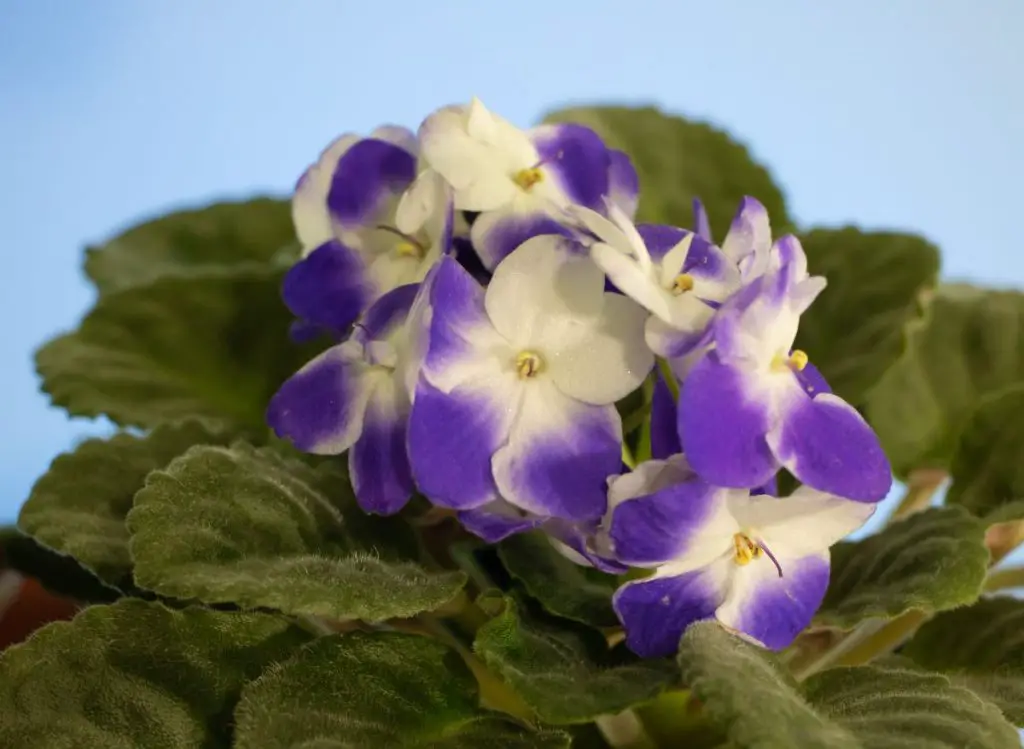Who does not love a beautiful flower display that adds flair to their living room? Plants and flowers play significant roles in ordinary human lives. They are presented as a sign of love and appreciation, and they beautify places and occasions.
One such unique plant is the African violet. It is often plated indoors, with dark green leaves and bright colored flowers, making its environment stand out. You can choose an African violet whose flowers blend well with your interior décor.
However, you may wonder how often do African violets bloom? If you take good care of them, African violets can bloom almost throughout the year. Generally, African violets enjoying the best care will bloom between 10-12 months every year, with each bloom lasting 2-3 weeks.
What does it involve to take care of your African violets properly? Since you plant them indoors, you will provide them with adequate indirect sunlight by placing them near the right window. You will also ensure correct watering and fertilizing practices.
Check out this detailed article on African violet light requirements.

So Why Is My African Violet Not Blooming?
Are you worried because your African violets seem to have stopped blooming? It has taken some time since they last shed their flowers, and there are no signs of new ones.
Many people who experience this phenomenon struggle to diagnose the problem. African violets are delicate plants with simple demands; if even one of those demands is not met, they will withhold their pretty petals.
Fortunately, these flowering conditions are easy to remedy, and within no time, your plant will be happy and healthy to bloom again. Let’s discuss some of the common culprits that may hinder all-year blooming.
1- Inadequate Light May Cause African Violets To Not Bloom
If the lighting is too little, your African violet will stretch for the light, producing little or no flowers. These plants thrive well in indirect sunlight when placed on the north and east-facing windows.
Ensure the plant has a sheer curtain to block strong rays from the sun, especially during summer. The 16-hour light triggers the formation of the hormone florigen, but this hormone triggers blooming in the dark. So, ensure the plant enjoys at least an 8-hour darkness.
- Solutions: During wintertime, ensure you place your African violet near an east-facing window that gives your plant full light without the risk of sunburn.
2- A House With Low Humidity May Cause Your African Violets To Not Bloom.
In the wild, African violets bloom between 70 and 80% humidity. Many households are within this range. African violets can even grow and bloom in conditions with 50% humidity, meaning most households will do well with them.
Nevertheless, if your house’s humidity is significantly lower, it may stress the plant. Low humidity causes the plants to lose more water than they take in, resulting in various issues, including buds failing to open.
- Solutions: To improve the humidity levels for your African violets, you can use a humidity tray or place your African violet pot on top of a plate of pebbles and water.

3- Insufficient Fertilizer Can Cause Your African Violets To Not Bloom
Poor fertilizing practice will also impact how your African violets bloom. In the wild, they get nutrients from the soil and decaying matter, but indoors, they wholly depend on you to supply them with needed nutrients.
Ensure you do not overfertilize your African violet since their small pots cannot maintain excess nutrients. Too much fertilizer provides lots of nitrogen, resulting in lush foliage and no flowering. On the other hand, if you fail to fertilize them regularly, they may not have the nutrient to stimulate blooming.
Ensure the fertilizers you use on African violets are balanced and made specifically for the plants. These fertilizers are often loaded with major nutrients, including nitrogen, potassium, phosphorus, magnesium, and iron.
- Solutions: Avoid fertilizers with urea as a nitrogen source since it can burn the roots of your African violets (according to The African Violet Society of America). Moderately use the fertilizers for optimum results; more is not good for your plants.
4- High Temperature In The House Can Cause Your African Violets To Not Bloom
We have already established that African violets thrive in average household conditions. Nevertheless, your African violets could be on the receiving end of your house; that feels like burning hell.
These plants do well in the daylight temperatures ranging from 75 to 85 degrees Fahrenheit and night temperatures ranging from 65 to 70 degrees Fahrenheit. Most households have slight variations in these temperatures, and African violets are okay with this.
However, extreme heat will stress the plant, while extreme cold could stunt their growth and negatively affect blooming. Most houses are often cold, especially during winter.
- Solutions: If you suspect a drastic drop in temperature during winter nights, you can move your plants away from the window and return them during the day.
An occasional drop in your house’s temperature because of a power outage should not worry you. The sustained drop in temperature may stress the plant and affect the blooming.
5- Improper Soil Mix Can Cause Your African Violets To Not Bloom
Your African violets may fail to bloom because the soil contains substances that hinder nutrient absorption. Anti-nutrients often build up over time and may require washing or replanting to a different pot with new soil.
The soil’s pH value can also affect the African violet’s ability to bloom. If the pH value is too high or too low, it will interfere with the plant’s ability to absorb nutrients from the soil. Generally, the African violet plant grows well on soil with a pH value of 6.8.
- Solutions: You can naturally adjust your soil’s pH level by using organic materials, including well-decomposed compost, coffee grounds, compost tea, elemental garden sulfur, mulch, and sphagnum peat moss.
6- Choosing The Wrong Pot Size Can Cause Your African Violets To Not Bloom
Did you recently repot your African violet to a larger pot? African violets love to be root-bound; a large pot does not help create this, affecting the blooming process.
- Solutions: It is recommended that you periodically repot your houseplants to refresh the soil, but you can use the same pot after thoroughly cleaning it. The general rule is that pots should not be more than one-third of the plant’s diameter.
7- Pests And Disease Also Cause Your African Violets To Not Bloom
If your African violet is not blooming, pests and diseases could also be the problem.
- Solutions: Check the leaves to see if your plant is showing signs of sickness. You could notice yellowing leaves as a sign of disease. A stressed plant cannot bloom as expected, requiring that you take action to address the problem immediately.
Do African Violets Bloom All Year?
Your African violet can perfectly bloom year-round, but you must maintain suitable conditions to realize this result. Some growers are concerned about their plants not blooming in similar conditions; they used to bloom beautifully.
The above-discussed reasons could cause your African violets not to bloom as frequently as you would like. Check your lighting, humidity, watering, soil quality, fertilizing, and room temperature. If one of these requirements is not optimal, your plant may not bloom.
If your house has insufficient natural light, especially during winter, you can supplement with artificial light such as fluorescent tubes and bulbs. These lighting systems will provide the needed heat and light for the plant, encouraging foliage growth and blooming.
How Often Can You Fertilize African Violets?
Generally, African violets need fertilizers every 4 to 6 weeks during the growth period. Before placing fertilizers in the soil, ensure the soil is well moistened. You can use soluble powder formula to achieve an immediate result; however, if you use concentrated liquid to enhance absorption, follow the manufacturer’s dilution instructions.
Furthermore, house plants rely on the grower for nutrients through the fertilizing process. If you do not supply adequate fertilizers, the plant will experience stunted growth and fail to blossom.
Too much fertilizer is also dangerous as it can damage the plant’s roots and stem. Therefore, there is a need to balance the frequency and the amount of fertilizer fed to African violets.
If you use municipal water, let the water sit open for at least 24 hours before using it to prepare African violet fertilizer. The chlorine in the municipal water can be damaging to your fragile plants. If you can access rainwater or chlorine-free water, the better.
Alternatively, you can take the organic route and use worm castings, fish emulsion, or diluted compost tea. However, since these compounds are primarily nitrogen, you can buy a little bat guano for mixing to prevent toxic salt build-up. Ensure you flush the pot at least four times yearly to remove the salt from the soil and around the rim.
Remember that African violet do not require fertilizers during winter, so avoid over-fertilizing. However, if you are using artificial light during winter, you may need to feed them fertilizers, especially when the foliage has lighter green color.
You can buy any water-soluble fertilizer for household plants, but ensure it has a balanced nutrient value. The three most valuable nutrients for an African violet plant are nitrogen, potassium, and phosphorus, so ensure what you are buying has these elements. Before applying fertilizer to your household plant, carefully read the instructions and follow through for the best result.
Are Coffee Grounds Good For African Violets?
Coffee grounds are an excellent natural and homemade fertilizer for African Violets. Coffee grounds are known to be slightly acidic (that is not always the case as they fluctuate). They also contain nitrogen, encouraging African violets to bloom and grow stronger and healthier.
From time to time, try to sprinkle used coffee grounds on top of your African violet potting soil to promote growth and blooming. Coffee grounds are excellent, particularly for gardeners who don’t often use a balanced fertilizer.
I suggest adding coffee grounds to your compost pile for outdoor plants instead of using them on African violets.
You might be wondering how to use coffee grounds as fertilizer effectively; here is a detailed article to find out now!
Is Miracle Grow Good for African Violets?
Miracle-Gro® Blooming Houseplant Food is an excellent fertilizer for African violets as it will make them bloom more and brighter. For optimal results:
- Add two pumps of Miracle Grow to the water reservoir of a self-watering pot every week when you change the water.
- And if you are using a traditional container, add your Miracle Grow directly to the soil or mix it with the water in your watering can.
- Ensure you carefully follow label directions.
Wrapping Up
African violets can bloom throughout the year if all their growing conditions are met. They should enjoy adequate indirect light, have adequate fertilizing, and suitable humidity. You should also ensure the plants are properly watered- avoid overwatering or watering from above.
Furthermore, the house temperature should be suitable- not too cold or too hot. Generally, African violet plants need good care, and you will see them blossom and change how your house looks.


